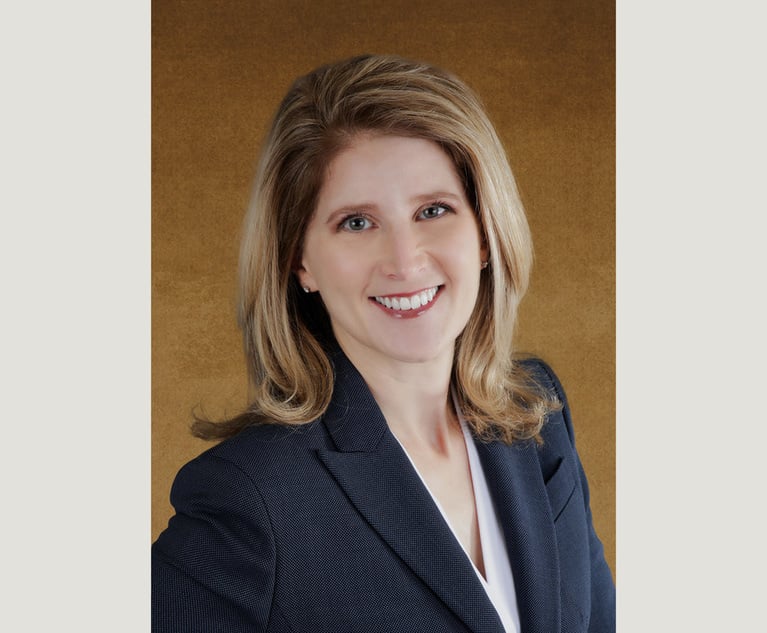States' Efforts to Ban Balance Billing Practices Is No 'Surprise'
Beyond a routine annual check-up and an apple a day in hopes of keeping the doctor away, individuals enrolled in private health benefit plans generally are not keen to see the inside of a hospital or emergency department.
August 24, 2018 at 04:15 PM
10 minute read
 Adam J. Petitt, left, and Steven B. Davis, right, of Stradley Ronon Stevens & Young.
Adam J. Petitt, left, and Steven B. Davis, right, of Stradley Ronon Stevens & Young.
Beyond a routine annual check-up and an apple a day in hopes of keeping the doctor away, individuals enrolled in private health benefit plans generally are not keen to see the inside of a hospital or emergency department. However, when emergency or more extensive treatment is necessary, so long as the patient goes to his health insurance carrier's in-network providers, and so long as premiums, deductibles and co-insurance are paid, covered persons expect that their carrier will pay for the cost of their medically necessary care. Unfortunately, in many states, including Pennsylvania, even if a covered individual receives treatment in an in-network hospital or emergency department (often for emergent reasons beyond their control), there is often a terrible surprise awaiting them when the bills start to arrive. In many cases after the ordeal, patients learn they were treated by an out-of-network provider when they receive an unexpected “balance bill” from that provider. This scenario is becoming more frequent in light of increasing complexity in how health care facilities contract with providers and how health insurance carriers develop their networks. These surprise charges contribute to the rising costs of health care, and covered persons find themselves with little to no recourse. With no federal laws explicitly prohibiting this practice, a number of states are stepping up to enact “surprise balance billing” laws that protect health care consumers and ensure they receive the information necessary to make informed decisions about their health care.
An in-network provider is a physician, hospital or other health care provider with whom a health plan has a negotiated reimbursement rate for covered medical services. “Balance billing” refers to an out-of-network provider's practice of charging covered persons for the difference between their fees for medical services, which are not negotiated with the carrier, and the carrier's allowed fee amount under the terms of the plan. Balance billing typically occurs in two settings. First, where a covered person chooses to see an out-of-network provider and their plan provides coverage for such services, they are responsible for that provider's billed charges beyond what the plan agrees to pay. For example, where a plan provides coverage for out-of-network care with a 60 percent coinsurance obligation, the covered person is responsible for 60 percent of the provider's billed charges. The plan will pay the remaining 40 percent of the covered services. In these instances, the covered person is aware that they have gone outside the plan's contracted network of providers and is making an informed decision about their care and knowingly taking on the responsibility of the balance bill.
Second, covered persons are vulnerable to balance billing and lack protection in situations where they visit an emergency department or in-network hospital and unwittingly receive treatment from an out-of-network provider, such as a specialist, anesthesiologist or radiologist. When covered persons are ill or have a medical emergency, they usually do not have the presence of mind to decipher whether a provider is out of their plan's network. Through no fault of their own, the covered person is left with the balance of the provider's billed charges which can be considerably higher than the negotiated rate of an in-network provider. In both scenarios, carriers and out-of-network providers may wage war over the amount of the reimbursement rate for covered services (from which the carrier will pay 40 percent in the example above). The objective of balance billing laws is to insulate covered persons from the financial burdens of unwitting balance bills and to keep them out of potential carrier-provider crossfire over appropriate reimbursement rates.
The majority of states do not have laws in place that directly protect covered persons from balance billing by an out-of-network provider in an emergency department or in-network hospital setting. In fact, only 21 states offer at least some limited measure of protection against balance billing. Most of these state laws apply to emergency services received from out-of-network providers, but few address surprise balance bills for treatment by an out-of-network provider in an in-network hospital. Some of the laws have a very narrow scope (for instance, application only to ambulance services), and others are limited to a subset of insurance products, such as health maintenance organizations (HMOs). After reviewing some of these efforts in other states, Pennsylvania Gov. Tom Wolf and Insurance Commissioner Jessica Altman have worked with the General Assembly to combat surprise billing, and this culminated with the introduction of two bills—House Bill 1553 and Senate Bill 678. The proposed legislation before the House, entitled “Surprise Balance Bill Protection Act,” is aimed at taking consumers out of the middle of the reimbursement process between the provider and carrier and follows in the footsteps of the six states that have adopted a more comprehensive approach to prohibit the practice of balance billing in its entirety.
States have expanded protections to a wide array of balance billing scenarios and imposed disclosure and transparency obligations on carriers and providers. The states adopting more comprehensive laws incorporate an inclusive approach by:
- Including protections in emergency department and in-network hospital settings.
- Prohibiting providers from balance billing and requiring carriers to hold their members harmless.
- Adopting reimbursement rate standards and a payment dispute resolution process.
- Applying the laws to all types of managed care products, including HMOs and preferred provider organizations (PPOs).
Like Pennsylvania's proposed bills, the objective in passing a comprehensive balance billing law is apparent—keep covered persons out of the middle of carrier-provider payment disputes. It should come as no surprise that leading the way for these comprehensive laws are some of the most densely populated states with the most covered persons per capita—Connecticut, New York, Maryland, Florida and New Jersey.
The most significant impact comprehensive balance billing laws have on carriers and out-of-network providers is with regard to how they mandate that payment disputes be resolved. For example, Connecticut requires that a provider be reimbursed with the greater of the amount an in-network provider would receive for the same service, the “usual, customary and reasonable rate”—defined as the 80th percentile of all charges for services performed by a provider in the same or similar specialty and rendered in the same area or the amount Medicare would reimburse for the service. In New York, the carrier is responsible for establishing a reasonable payment amount and must show how that amount compares to “usual and customary rates”—defined as the 80th percentile of all charges made available by FAIR Health, an independent entity that maintains a medical bill database.
On June 1, New Jersey became the latest state to pass a comprehensive balance billing law when Gov. Phil Murphy signed the Out-of-Network Consumer Protection, Transparency, Cost Containment and Accountability Act, which comes into effect 90 days after its enactment. (Assembly Bill No. 2039). Under New Jersey's law, upon receipt of a bill from a provider that provided inadvertent out-of-network services or emergency services to a covered person, the carrier has 20 days to pay the bill or notify the provider that its claim is excessive. If the parties cannot reach an agreeable reimbursement rate for the covered services, the carrier must pay the out-of-network provider the amount it deems its “final offer” for the covered services.
If the out-of-network provider is unwilling to accept the carrier's “final offer” as an acceptable reimbursement rate, then either party may initiate a binding arbitration proceeding that is akin to arbitration process used by Major League Baseball. During arbitration, the carrier and out-of-network provider will submit their written materials to the arbitrator along with their respective “final offers” representing their perceived appropriate reimbursement rate. The arbitrator's decision will consist of one of the final offers submitted by the parties and shall be binding. In making its determination, the arbitrator can consider a variety of specified factors. An exemption exists for self-funded plans which may elect not to be subject to this process. However, an out-of-network provider is then permitted to balance bill a covered person of such an exempted self-funded plan.
In addition to its unique dispute resolution and reimbursement process, New Jersey's balance bill law prioritizes and imposes a litany of transparency and disclosure obligations for carriers and out-of-network providers to covered persons. With regard to out-of-network providers, among other disclosures, before scheduling a non-emergency or elective procedure, a health care facility, such as a hospital, is now required to disclose whether it is in-network and advise the covered person (1) to ask whether their physician is in- or out-of-network and (2) to contact their carrier for further consultation on costs. A facility must also make available to the public a list of the facility's “standard charges” for all items and services provided by the facility. Similarly, an individual health care professional is required to disclose the health plans with which he or she participates prior to engaging a covered person in non-emergency services, including laboratory testing ordered by an in-network physician and performed by an out-of-network laboratory. Health care professionals must also inform the covered person if they do not participate in the covered person's plan's network and provide the covered person with a billing estimate and the associated current procedural technology (CPT) codes, if requested. Covered persons must also be advised that they have a financial responsibility to pay for services provided by an out-of-network professional.
As for carriers, some of their disclosure obligations include providing covered persons with a clear and understandable description of the plan's out-of-network benefits, including:
- The methodology used to determine the amount allowed for out-of-network services and the amount of reimbursement under that methodology.
- Examples of anticipated out-of-pocket costs for frequently billed out-of-network services;
- Information that reasonably permits a member to calculate anticipated out-of-pocket costs for out-of-network services.
- Information regarding whether a particular provider is in-network.
- Access to a telephone hotline for questions about network status and out-of-pocket costs.
A carrier must also notify the covered person if the network status of a particular facility or provider changes after the carrier authorizes a service from that facility or provider and include in the explanation of benefits documents that “inadvertent and involuntary” out-of-network charges are not subject to balance billing beyond the financial responsibility incurred under the terms of the contract for in-network service.
While concerns about the rising cost of health care is nothing new, the lack of federal regulations and policy solutions to balance billing practices and continued growth of narrow provider networks, as well as the successful implementation of comprehensive balance billing laws, confirms that we will continue to see the door widen further for more states to enact their own safeguards to protect covered persons from unexpected and excessive balance billing charges, while also putting in place a resolution process for providers and carriers to determine acceptable reimbursement rates—without involving the insureds. Moreover, as Pennsylvania, New Jersey and other states expand on these consumer protections, carriers and out-of-network providers will be presented with new business and compliance challenges as they adapt to the growing prohibition on balance billing.
Steven B. Davis is a nationally recognized insurance regulatory and coverage practitioner. As chair of Stradley Ronon Stevens & Young's insurance practice, Davis helps manage the firm's insurance-related regulatory and coverage dispute and litigation engagements.
Adam J. Petitt is a trial lawyer in the firm's health care practice who counsels health insurance carriers, providers, hospitals and health systems in complex commercial civil and regulatory matters, white-collar criminal defense, and corporate compliance.
This content has been archived. It is available through our partners, LexisNexis® and Bloomberg Law.
To view this content, please continue to their sites.
Not a Lexis Subscriber?
Subscribe Now
Not a Bloomberg Law Subscriber?
Subscribe Now
NOT FOR REPRINT
© 2025 ALM Global, LLC, All Rights Reserved. Request academic re-use from www.copyright.com. All other uses, submit a request to [email protected]. For more information visit Asset & Logo Licensing.
You Might Like
View All
Pa. Supreme Court to Decide Enforceability of 'Browsewrap' Arbitration Agreements
8 minute read
From a Mediator’s Perspective: Common Mis-steps That Parties Make at Mediation
6 minute readTrending Stories
- 1M&A Transactions and AB 1824: Navigating New Privacy Compliance Challenges
- 2Devin Nunes, Former California GOP Congressman, Loses Move to Revive Defamation Suit
- 3Judge Sides With Retail Display Company in Patent Dispute Against Campbell Soup, Grocery Stores
- 4Is It Time for Large UK Law Firms to Begin Taking Private Equity Investment?
- 5Federal Judge Pauses Trump Funding Freeze as Democratic AGs Launch Defensive Measure
Who Got The Work
J. Brugh Lower of Gibbons has entered an appearance for industrial equipment supplier Devco Corporation in a pending trademark infringement lawsuit. The suit, accusing the defendant of selling knock-off Graco products, was filed Dec. 18 in New Jersey District Court by Rivkin Radler on behalf of Graco Inc. and Graco Minnesota. The case, assigned to U.S. District Judge Zahid N. Quraishi, is 3:24-cv-11294, Graco Inc. et al v. Devco Corporation.
Who Got The Work
Rebecca Maller-Stein and Kent A. Yalowitz of Arnold & Porter Kaye Scholer have entered their appearances for Hanaco Venture Capital and its executives, Lior Prosor and David Frankel, in a pending securities lawsuit. The action, filed on Dec. 24 in New York Southern District Court by Zell, Aron & Co. on behalf of Goldeneye Advisors, accuses the defendants of negligently and fraudulently managing the plaintiff's $1 million investment. The case, assigned to U.S. District Judge Vernon S. Broderick, is 1:24-cv-09918, Goldeneye Advisors, LLC v. Hanaco Venture Capital, Ltd. et al.
Who Got The Work
Attorneys from A&O Shearman has stepped in as defense counsel for Toronto-Dominion Bank and other defendants in a pending securities class action. The suit, filed Dec. 11 in New York Southern District Court by Bleichmar Fonti & Auld, accuses the defendants of concealing the bank's 'pervasive' deficiencies in regards to its compliance with the Bank Secrecy Act and the quality of its anti-money laundering controls. The case, assigned to U.S. District Judge Arun Subramanian, is 1:24-cv-09445, Gonzalez v. The Toronto-Dominion Bank et al.
Who Got The Work
Crown Castle International, a Pennsylvania company providing shared communications infrastructure, has turned to Luke D. Wolf of Gordon Rees Scully Mansukhani to fend off a pending breach-of-contract lawsuit. The court action, filed Nov. 25 in Michigan Eastern District Court by Hooper Hathaway PC on behalf of The Town Residences LLC, accuses Crown Castle of failing to transfer approximately $30,000 in utility payments from T-Mobile in breach of a roof-top lease and assignment agreement. The case, assigned to U.S. District Judge Susan K. Declercq, is 2:24-cv-13131, The Town Residences LLC v. T-Mobile US, Inc. et al.
Who Got The Work
Wilfred P. Coronato and Daniel M. Schwartz of McCarter & English have stepped in as defense counsel to Electrolux Home Products Inc. in a pending product liability lawsuit. The court action, filed Nov. 26 in New York Eastern District Court by Poulos Lopiccolo PC and Nagel Rice LLP on behalf of David Stern, alleges that the defendant's refrigerators’ drawers and shelving repeatedly break and fall apart within months after purchase. The case, assigned to U.S. District Judge Joan M. Azrack, is 2:24-cv-08204, Stern v. Electrolux Home Products, Inc.
Featured Firms
Law Offices of Gary Martin Hays & Associates, P.C.
(470) 294-1674
Law Offices of Mark E. Salomone
(857) 444-6468
Smith & Hassler
(713) 739-1250







